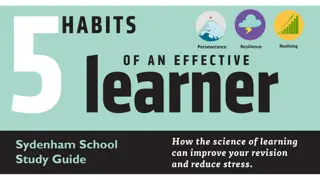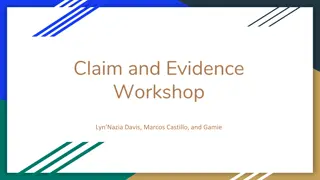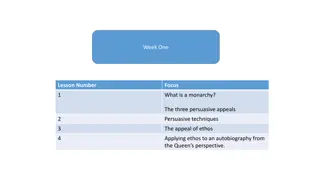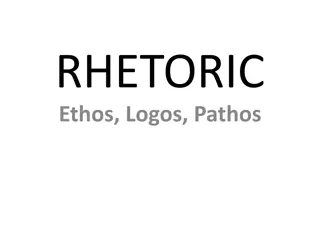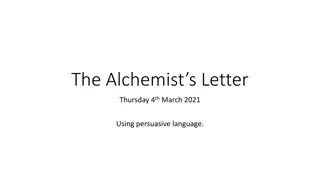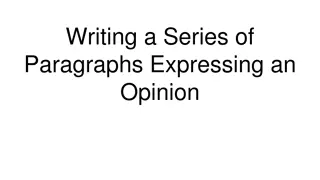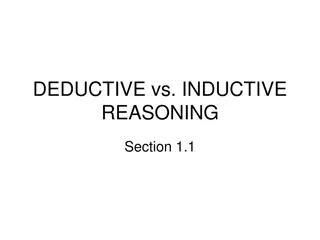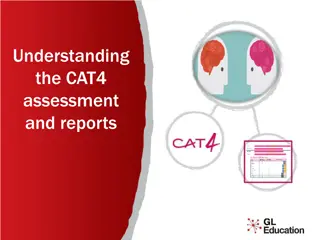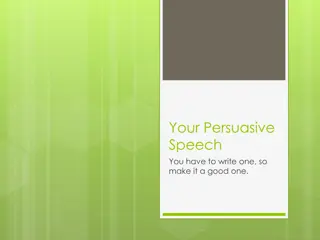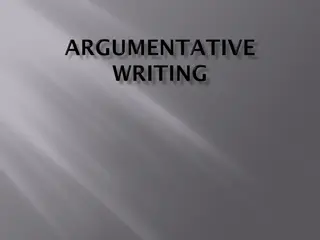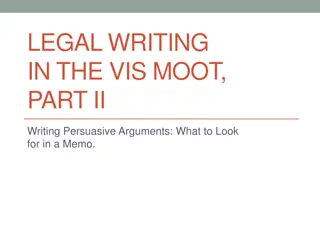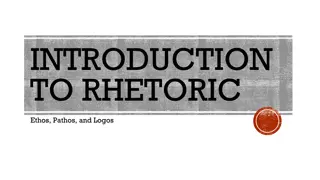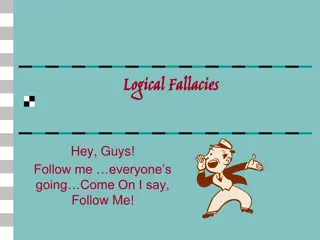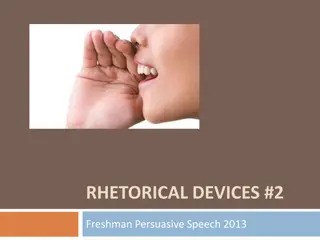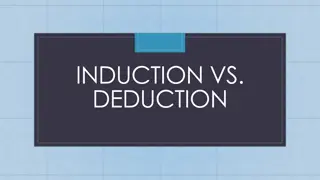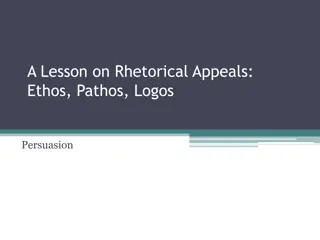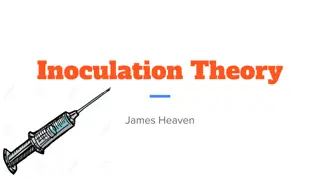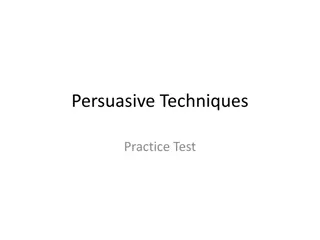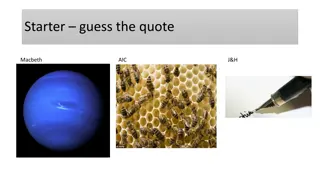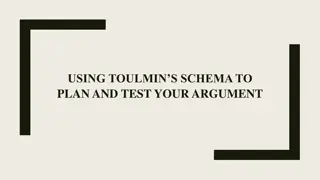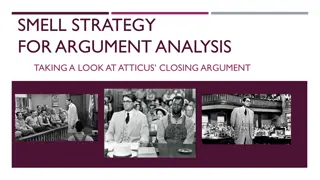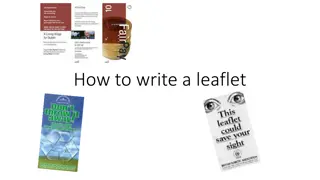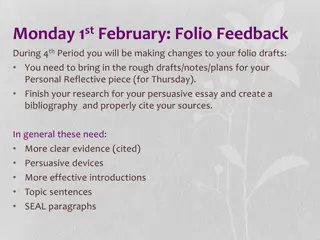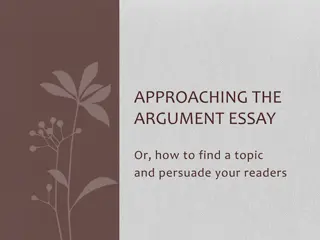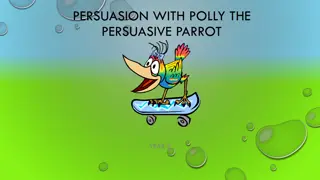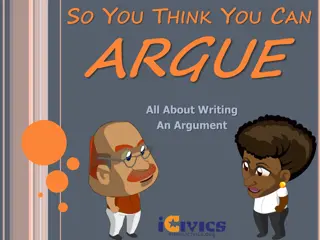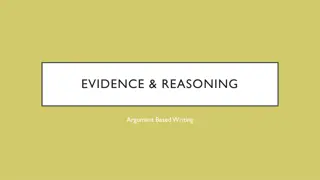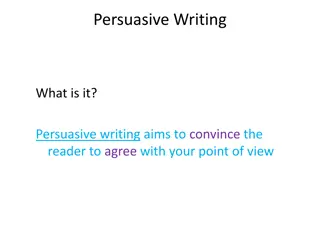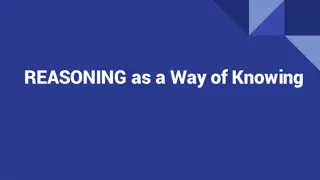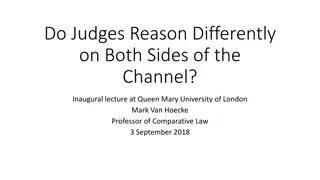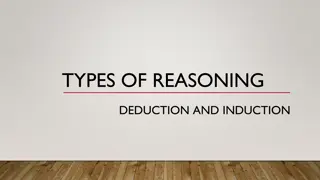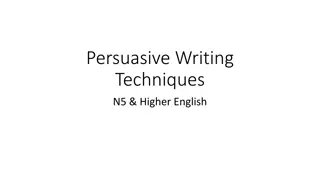Communications Merit Badge Requirements for Troop 344/9344 in Pemberville, OH
Explore the various communication activities and skills required to earn the Communications Merit Badge. Engage in logging, journaling, group discussions, persuasive presentations, interviews, attending public meetings, teaching plans, and opinion sharing to enhance communication abilities. Develop
0 views • 76 slides
Understanding Inductive and Deductive Reasoning
Inductive reasoning involves drawing general conclusions from specific observations, while deductive reasoning starts with general premises to derive specific conclusions. Induction uses experience or experimental evidence to make broad conclusions, while deduction follows from general to specific.
5 views • 7 slides
Effective Revision Strategies for Year 8 English Summer Exams
Discover effective revision strategies for the Year 8 English Summer Exams, including retrieval practice, flashcards, mind maps, and persuasive writing techniques. Learn how to structure persuasive responses using AFOREST (logic/reason, credibility/trust, emotions/values) and identify key features i
4 views • 19 slides
Mastering the Toulmin Method for Constructing Persuasive Arguments
Learn how to effectively structure arguments using the Toulmin Method, which consists of Claim, Data, Warrant, Backing, Counterclaim, and Rebuttal elements. Explore reasoning and logic concepts, differentiate between inductive and deductive reasoning, and understand how to construct valid arguments
0 views • 30 slides
Understanding Monarchy: A Study in Persuasive Appeals
Introduction to the concept of monarchy as a form of government and its various manifestations, exploring persuasive appeals and the application of ethos through the perspective of a queen. The content delves into the role of a monarchy in modern society and encourages critical analysis through tran
10 views • 18 slides
Understanding Rhetoric: Ethos, Logos, Pathos in Persuasion
Rhetoric explores the art of persuasive communication, emphasizing three key components: Ethos (credibility), Logos (logic/facts), and Pathos (emotion). Understanding the three types of rhetoric and persuasive appeals can enhance one's ability to craft compelling arguments. Through examples, student
0 views • 10 slides
Understanding the Power of Persuasive Language in "The Alchemist's Letter
Explore the art of persuasion through persuasive language techniques like repetition, emotive language, exaggeration, and rhetorical questions as used in "The Alchemist's Letter." Delve into how Nicholas tries to persuade his son using these methods to prevent past mistakes from recurring.
0 views • 14 slides
Exploring Current Social Issues and Persuasive Writing
Discover how to craft a compelling Higher Persuasive Folio essay by brainstorming persuasive topics and diving into current interesting issues. Avoid banned topics and focus on honing persuasive techniques for a successful essay.
2 views • 36 slides
Should Students Have Homework? Crafting a Persuasive Argument
Crafting a persuasive argument on the topic of whether students should have homework, this piece presents a well-structured approach for expressing an opinion effectively. It guides the reader through forming an introduction with a clear position, developing supporting points in body paragraphs, and
0 views • 10 slides
Understanding Deductive Reasoning and Problem Solving in Logic
Explore the concepts of deductive reasoning, problem-solving logic, and Venn diagrams in this informative content. Learn about the process of drawing conclusions from known facts, using syllogisms to make valid arguments, and understanding the difference between truth and validity in deductive reaso
7 views • 16 slides
Understanding the CAT4 Assessment and Reports
CAT4, the Cognitive Abilities Test Fourth Edition, assesses students' abilities in verbal, quantitative, non-verbal, and spatial reasoning. It distinguishes between ability and attainment testing and is used to identify academic potential, understand student thinking, determine support needs, highli
1 views • 15 slides
Mastering the Art of Persuasive Speech
Crafting a persuasive speech involves captivating introductions, compelling content, and impactful conclusions. Learn the essential elements: attracting attention, establishing credibility, motivating action, and more. Explore methods for developing engaging introductions and powerful conclusions. D
3 views • 31 slides
Effective Argumentation Framework for Persuasive Writing
This comprehensive guide outlines the key components of a strong argumentative essay, including claim, evidence, reasoning, counterclaim, and rebuttal. It emphasizes the importance of building a debatable and well-supported claim, providing reliable evidence, and utilizing logical reasoning. Additio
0 views • 9 slides
Mastering Persuasive Legal Writing: Tips for Effective Memo Crafting
Crafting a persuasive legal memo involves structuring your arguments with clear headings, following the IRAC method, maintaining logical paragraph structure, providing examples, and ensuring proper citations. By emphasizing argument clarity, structure, and support, you can elevate the impact of your
0 views • 10 slides
Understanding Rhetoric: Ethos, Pathos, Logos
Rhetoric is the art of persuasive communication in various contexts. It involves utilizing ethos (credibility), pathos (emotions), and logos (logic) to influence the audience. Distinguishing between argument and persuasion, this communication form employs elements such as organization patterns, appe
4 views • 18 slides
Understanding Logical Fallacies and Persuasion Techniques
Learn about logical fallacies, persuasive writing, propaganda, and types of fallacies with examples like circular reasoning and false causality. Recognize how persuasive texts aim to influence readers and the importance of critical thinking when encountering different argumentative strategies.
0 views • 31 slides
Mastering Claims, Evidence, and Warrants for Persuasive Writing
Understanding the concepts of claims, evidence, and warrants is crucial for constructing persuasive arguments. Claims represent positions to persuade, evidence supports claims with facts, and warrants bridge the gap between evidence and claims. An exercise is outlined to help practice forming claims
0 views • 8 slides
Creative Teaching Approaches for Persuasive Writing Workshop
The workshop focuses on using Grammar for Writing principles to enhance teaching of persuasive writing, emphasizing modal verbs and adverbials. It encourages creative writing by engaging young writers' imaginations and beliefs, allowing freedom to explore ideas. Participants learn key teaching princ
0 views • 51 slides
Mastering Rhetorical Devices for Persuasive Speech - Tips & Examples
Unveil the power of rhetorical devices in persuasive speech through parallelism, rhetorical questions, analogies, personification, and allusions. Understand how to captivate your audience and convey your message effectively using these tools.
1 views • 11 slides
Understanding Deductive and Inductive Reasoning in Problem-Solving
Explore the differences between deduction and induction in problem-solving approaches. Deductive reasoning starts with a general statement and moves to specifics, offering certainty and objectivity, while inductive reasoning begins with specifics and arrives at a generalization, providing flexibilit
0 views • 11 slides
Understanding Rhetorical Appeals: Ethos, Pathos, Logos
Delve into the art of persuasive communication through the exploration of ethos, pathos, and logos appeals. Discover how these rhetorical tools are utilized to sway audiences' emotions, logic, and credibility. Gain insights on how to analyze and decipher persuasive techniques employed by writers, sp
0 views • 26 slides
Understanding Inoculation Theory: A Strategic Approach to Combatting Persuasive Messages
Inoculation theory, introduced by Dr. William J. McGuire in 1964 during the Korean War, emphasizes how thoughts, beliefs, and attitudes can be fortified through inoculation or vaccination to resist harmful persuasive messages. This theory equips individuals with cognitive strategies to build resista
0 views • 5 slides
Introduction to Code Reasoning in CSE331 Lecture
In this lecture, we delve into the fundamentals of code reasoning, focusing on forward and backward reasoning techniques in straight-line and if-statement code. The session includes reviewing the practice of identifying the strongest assertions and understanding the dual purposes of proving code cor
0 views • 24 slides
Mastering Persuasive Techniques: Practice Test Insights
Explore the art of persuasion through practice test scenarios covering logical, ethical, and emotional appeals, with examples and explanations. Identify various persuasive techniques like logical appeals, ethical appeals, and appeal to loyalty, while also recognizing loaded language in persuasive me
0 views • 25 slides
Unlocking Writing Techniques: Tips for Crafting Persuasive Letters to Newspaper Editors
Explore valuable writing techniques to enhance letters addressed to newspaper editors. Learn how to structure ideas effectively, utilize impactful punctuation, develop persuasive arguments, and engage readers with compelling language. Enhance your writing skills to make a powerful impact.
0 views • 12 slides
Using Toulmin's Schema to Plan Effective Arguments
Explore how Carmen applies Toulmin's schema to craft a compelling argument about the benefits of girls playing first-person-shooter video games. Her reasoning, grounded in personal experiences and societal perceptions, demonstrates the intricate planning required to support each claim effectively. B
0 views • 10 slides
Unveiling Persuasive Strategies in Atticus' Closing Argument
Explore the comprehensive analysis of persuasive strategies employed by Atticus in his closing argument, including ethos, pathos, logos, and linguistic devices. Delve into the intricacies of sender-receiver relationship, message content, emotional appeals, logical reasoning, and language choices.
0 views • 6 slides
Effective Strategies for Crafting Persuasive Leaflets
Craft impactful leaflets by tailoring them to the right audience, keeping them visually appealing, and incorporating persuasive language. Use headings, subheadings, and bullet points to organize information effectively. Employ a variety of techniques like A FOREST DRIP to engage and persuade readers
0 views • 6 slides
Mastering Persuasive Writing Techniques for NAPLAN Success
Learn how to identify and apply persuasive writing devices such as emotive language, rhetorical questions, superlative adjectives, and generalizations in your writing to effectively sway your audience. Enhance your persuasive skills and excel in your NAPLAN assessments with these powerful techniques
0 views • 44 slides
Enhancing Your Writing Skills for Academic Success
Improve your folio drafts by focusing on key elements such as clear evidence, persuasive devices, effective introductions, and topic sentences. Explore examples of outstanding folios and learn how to create impactful content with proper citations and bibliography. Discover ways to make a lasting imp
0 views • 28 slides
Mastering the Art of Persuasive Argument Essays
Learn how to select a compelling topic, brainstorm effectively, establish your stance, structure your essay, and craft persuasive arguments in this comprehensive guide to writing argument essays.
0 views • 12 slides
Discover the Art of Persuasive Writing with Polly the Persuasive Parrot
Dive into the world of persuasive writing techniques with Polly the Persuasive Parrot as your guide. Explore engaging activities such as interactive games, discussions, and debates to enhance your persuasion skills. Learn how to provide reasoned justifications, use modal verbs effectively, and engag
0 views • 22 slides
Mastering the Art of Writing Persuasive Arguments
Explore the nuances between persuasive writing and argument writing. Uncover the importance of using logic and reasoning in crafting convincing arguments, supported by warrants and backing. Learn how to structure a strong argument, incorporate rebuttals, and strengthen your claims with evidence and
0 views • 18 slides
Effective Argumentation in Writing: Evidence and Reasoning
A comprehensive guide on utilizing evidence and reasoning in argument-based writing. Learn how to incorporate facts, quotes, and statistics from reliable sources to support claims, and how to analyze and explain the evidence to strengthen your arguments. Examples illustrate the importance of evidenc
0 views • 5 slides
Master the Art of Persuasive Writing
Persuasive writing aims to sway the reader's perspective by presenting convincing arguments. Learn how to structure your writing effectively, use persuasive techniques, and craft compelling introductions to successfully persuade your audience.
0 views • 16 slides
Exploring Reasoning as a Method of Knowledge Acquisition
Reasoning serves as a fundamental way of knowing, enabling individuals to transcend immediate experiences, build knowledge, and evaluate beliefs. This process involves the application of logic, examining the interplay between beliefs, ideas, and truth. By integrating reason with imagination, individ
0 views • 37 slides
Contrasting Legal Reasoning in Common Law and Continental Law Systems
This inaugural lecture explores the differences in legal reasoning between judges on both sides of the English Channel. It delves into the declaratory theory of decision-making in Common Law and the application of legislative intent in Continental Law. The lecture also touches on the contrasting ind
0 views • 48 slides
TYPES OF REASONING DEDUCTION AND INDUCTION
Reasoning involves a connected sequence of thoughts leading to a conclusion. Deductive reasoning moves from general to specific, identifying assumptions and hidden premises. Categorical syllogisms demonstrate valid and sound argument structures, while real-life arguments may require uncovering assum
0 views • 21 slides
Mastering Persuasive Writing Techniques for N5 & Higher English
Explore key persuasive writing techniques such as A.F.O.R.E.S.T., personalizing your message, utilizing repetition, and creating impactful lists to effectively persuade your audience. Learn how to engage readers by making your writing personal and relatable while emphasizing important points. Enhanc
0 views • 22 slides
Forms of Moral Reasoning and Ethics in Decision-Making
Explore the main forms of moral reasoning in ethical decision-making, including virtue ethics, deontological reasoning, and teleological reasoning. Understand the importance of developing ethical virtues and principles in guiding behavior. Delve into examples of reasoning from virtue and deontologic
0 views • 28 slides


